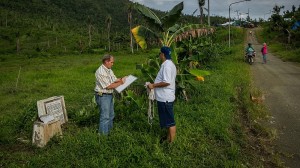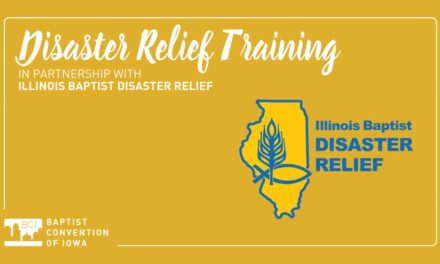A crushing wall of water from Typhoon Haiyan hit the city of Tacloban on Nov. 8, 2013. Thousands of people perished. Homes and businesses were destroyed.
The water beached cargo ships weighing several hundred tons. Water devastated Tacloban.
But water also is what people need most after the storm.
And water is the precious resource being provided by Christians like the Kansas-Nebraska Convention of Southern Baptists (KNCSB).
Baptist Global Response (BGR) is partnering with Carl and Suzie Miller, International Mission Board missionaries in Tacloban, not only to provide water, but also rebuild the city of Tacloban.
Global Hunger Relief funds are making it possible.
“It’s going to take a long, long time for Tacloban,” Suzie says and starts to cry.
The city has long-term needs, “everything from getting water into their homes, to getting a home, to having their schools ready, maybe livelihood, just the whole gamut of getting people back on their feet and helping them to move forward,” Suzie says.
“For that long-haul building, it’s exciting to know that Southern Baptists are going to be here,” she adds.
The Kansas-Nebraska convention enlisted the help of Oklahoma Baptists because of their experience in drilling wells after the 2010 earthquake in Haiti. In July, a team installed two well pumps in Tacloban and in a small community on the outskirts of the city. Water4, an organization based out of Oklahoma, provided the well pumps.

IMB missionary Carl Miller surveys a well site in a village near Tacloban with Joey Rojero, a Filipino-American from the Kansas-Nebraska Convention of Southern Baptists. Many small villages have suffered severe disruption to their water supplies due to damage by Typhoon Haiyan. Kansas-Nebraska Southern Baptists were among the first to work with local IMB missionaries to help restore damaged water supplies in the Tacloban area.
Instead of bringing multiple teams from the U.S. to build and maintain the wells, Larry Thomas, former KNCSB director of disaster relief, said they enlisted help from local believers to drill the wells. In the future, they hope to see believers trained to maintain the wells.
Joey Rojero, a Filipino-American from Kansas, worked with believers from each of the communities where wells were drilled or repaired.
He has been Kansas-Nebraska’s man on the ground in the Philippines since April.
One of the wells that received a water pump is on the grounds of Kalipayan Baptist Church in Tacloban.
The church’s pastor said the wells will minimize expenses for his church and the church will be able to serve the community by providing water.
Wells meet a physical need in communities, but they also provide a source of income for the believers who were trained in well maintenance.
“It’s an economic blessing for life,” Thomas says.
Suzie agrees.
“One of the things that I appreciate about BGR also is not the coming in and doing it for people, but … looking at Taclobans as survivors, not as victims,” Suzie says.

WATER FOR LIFE Wells are an essential water source for inhabitants of many of the Philippines’ rural towns and villages. Typhoon Haiyan disrupted this water supply by damaging the pumping equipment of many wells and contaminating others with salt water and debris. Restoration of these freshwater supplies is a top priority for local IMB missionaries and their partners. Photo © 2014 IMB / Hugh Johnson
“Speaking as a survivor, as soon as you can begin to make decisions and do things for yourself, the healing takes place a whole lot faster and that’s one of BGR’s objectives in this long-haul, is to help people from Tacloban begin to help themselves,” she adds.
“In disaster relief, we often sort of race to the event,” Thomas says. “It’s Southern Baptists who stay. It’s Southern Baptists who continue to work.”
Though much has been accomplished through national and international relief organizations, Carl says full recovery is still a long way away.
“Long-haul healing is needed,” Carl says.
A tent city in Tacloban houses 500 families. United Nations tents patch up and cover many homes. Some typhoon survivors live in an encampment built in the shade created by massive freighter boats flung from the bay onto land by the storm surge.
Some of these families will move from the tents to bunkhouses and will later be resettled. In one of the bunkhouse areas, there are four restrooms and two showers for 24 families.
Though Global Hunger Relief and BGR’s involvement in disaster relief in the Philippines began in November, their work in Tacloban began in April. After the typhoon, as the world’s attention focused on Tacloban, Southern Baptist relief efforts focused on other areas not in the media spotlight.
Although the work in Tacloban is just beginning, the Millers say the assistance provided by Global Hunger Relief comes at a perfect time. Some of the relief organizations pulled out of Tacloban in July — the same month the two well pumps were installed.
Wells are an excellent introduction into communities and are an answer to prayer for the Millers.
In the past, the Millers tried to get churches in the U.S. to adopt a neighborhood in prayer, but the idea never took off.
“I’d like to take that one step further and not just sponsor a well, but I would like them to take on that ‘barangay’ [neighborhood] as a prayer partner,” Suzie says. “This church would pray for the barangay … and minister to the whole community.”
“I believe disaster relief is one of the best opportunities for people to move from ‘I am a follower’ to ‘I am a disciple maker,’” Thomas says. “It’s going to be a catalyst to open a lot of doors.”
Global Hunger Relief funds also will be used to meet chronic needs like medical care, education and food security.
Learn how you can help combat hunger by visiting www.globalhungerrelief.com or following Global Hunger Relief on Twitter or Facebook.
Find out how you can be a partner in restoring lives devastated by natural disasters overseas with Baptist Global Response.
This story was originally posted at commissionstories.com.








